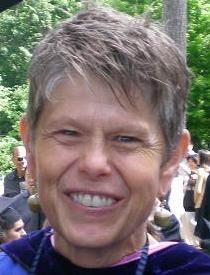| Reflections on Engaged Civic Learning and Teaching |
![PDF-NOTE: Internet Explorer Users, right click the PDF Icon and choose [save target as] if you are experiencing problems with clicking.](http://rsnonline.org/templates/rsntemplate-smallmasthead/images/pdf_button.png) |
 |
|
Page 1 of 3 Bobbi Patterson, Emory University
Community Internships and Classroom ConfrontationsAs Jan leaned into the wooden, oval seminar table, he set his eyes directly on Jason. The room bristled from the tension between these two seniors: Jan, a thin African-American man, and Jason, a stockier guy from the Mid-Atlantic. This “Religion Internship” class strove to link community-based experiences to religious studies theories: we focused on how communities make and share meaning and purpose and act ethically. Community-based leaders helped me design the course and provided placements in which interns could learn through hands-on experiences. Students worked as medical assistants in a mobile healthcare unit, as case workers for families living with AIDS, and as in-take personnel at a large homeless shelter. Our methods for engaging these partnerships emphasized joining assets for community-defined change rather than focusing on needs (Kretzmann and McKnight). The class was initially designed in the year 2000, and now in 2010 we continued to work with many of these original community-partners. Before class began, each intern filled out an initial application form describing relevant experiences and what brought the intern to this course. In some cases, former interns vetted these applications, following up with interviews and initiating further discussion to help candidates sharpen their goals. By the end of this process, students had a solid idea of what they hoped for — and naturally, their internships ended up taking directions they never expected. Throughout the semester, they continued fine-tuning their goals and objectives using a suggested worksheet including due dates and requiring specific forms of assessment. Biweekly meetings with supervisors added input for that document as well as mentoring. Class time usually began with “check-ins:” sharing what happened, feelings, ethical dilemmas, questions about their experiences that warped the theories we read. We analyzed texts and then put them in dialogue with the students’ actual work. Discussions reflected a class-developed covenant of behaviors and attitudes, respect, listening to the end, etc. By the time the tension between Jason and Jan broke out, we knew a good deal about each other and how we thought. In fact, our communication skills sharpened through serious discussions like that of Jason and Jan. We learned to trust enough to go deeper into the tough issues of racism, structural poverty, and religious and ethical responses. Yet that day, I felt anxious as Jan pressed Jason, a white man. Jan said Jason could never grasp the damage of white domination. Why had Jason’s retort, that he would not be reduced to the cause of all social ills, made my stomach tighten? Jan’s analytical heft took the conversation on to ethics and texts about structural racism, capitalism, and access to educational opportunity. Jason, on the other hand, drew from material by Colby, Ehrlich, et. al., focusing on moral responsibility in relation to citizenship. Both spoke well to different levels and aspects of our shared concerns, how to think and act effectively for justice. But failing at that moment to bridge the gap, they fumed and stalled in mutual frustration as their younger classmates tried to figure out if this kind of confrontation was okay in class. Over years of teaching this class, I felt my stomach turn. I struggled to invite students to take charge of their own conceptual and experiential learning and really mean it. It made me feel so out of control in my own class! But as I realized I had to let them learn to stand on their own feet, they thrived, drawing deeply from the wells of unresolved, even unaddressed, issues in our communities. Through structured portfolio assignments, they grew more observant about causal factors of poverty and racism. They pursued descriptions of organizations’ missions and leadership charts in order to integrate sources of value-conflicts among staff. They drew from our readings to shape proposals for new actions and decisions. They synthesized tough questions using and adapting ethical frameworks. How do a well-established and respected soup kitchen and its guests begin shaping mutual covenants of behaviors, which when broken, break the relationship for six months? Our class struggled theoretically and humanely with such real-world dilemmas. Would they actually refuse those guests food? |


 Barbara (Bobbi) Patterson is a Senior Lecturer in the religion department and has served the Emory community as the Associate University Chaplain, director of the Emory Scholars Program, founder of the Theory-Practice-Learning (TPL) Program, and as a faculty associate of the Office of Sustainability Initiatives. Patterson received her BA from Smith College, MDiv from Harvard University, and her PhD in religion from Emory University. Her current research focuses on the intersections of place, contemplative practices, and the ethics of sustainability. Patterson’s leadership in the classroom has earned her the 2010 Excellence in Teaching Award from the American Academy of Religion and she has published numerous articles on the scholarship of teaching.
Barbara (Bobbi) Patterson is a Senior Lecturer in the religion department and has served the Emory community as the Associate University Chaplain, director of the Emory Scholars Program, founder of the Theory-Practice-Learning (TPL) Program, and as a faculty associate of the Office of Sustainability Initiatives. Patterson received her BA from Smith College, MDiv from Harvard University, and her PhD in religion from Emory University. Her current research focuses on the intersections of place, contemplative practices, and the ethics of sustainability. Patterson’s leadership in the classroom has earned her the 2010 Excellence in Teaching Award from the American Academy of Religion and she has published numerous articles on the scholarship of teaching.